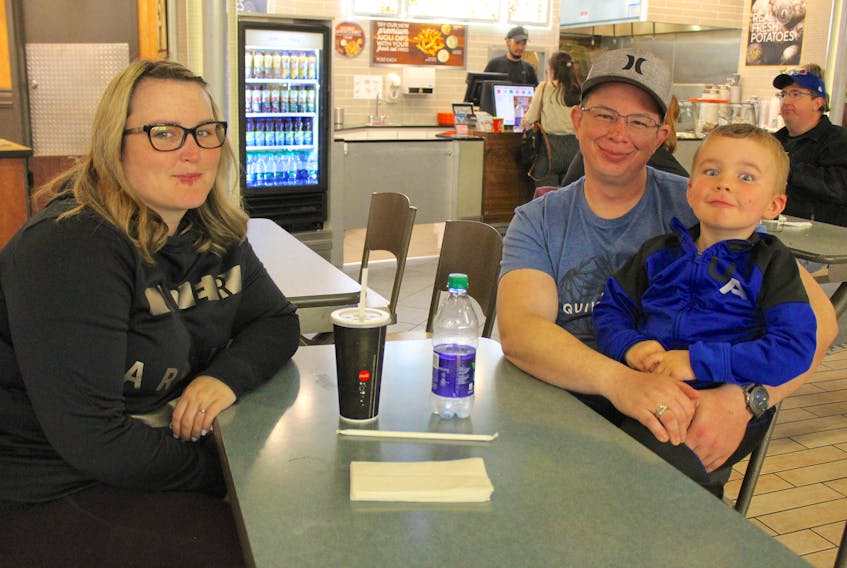SYDNEY, N.S. — Some Cape Bretoners are praising the federal Liberal government’s announcement to ban some single-use plastics by 2021.
And for others, it’s raising some questions.
Anju Virick and her daughter Ivy Leon love the idea, saying it's time something is done to combat the problems plastic waste cause in oceans, waterways and landfills.
“I’m all for it,” said Anju while shopping with her daughter and her sister-in-law, Lisa Virik, at the Mayflower Mall on Sunday.
“I think we have to eliminate the option to take them. It’s like when the seat-belt law came into effect. People were like, 'Oh no, we have to wear seatbelts?' and now everyone just does it. It will take some getting used to.”
Anju said she always carries silicon, reusable straws instead of taking plastic ones and has been carrying reusable shopping bags for the last six years — a move inspired by Leon.
Leon watched a documentary explaining the hazards of plastic bags to marine life and polar bears. Then eight years old, she started urging her mother to use reusable ones.
“If I forgot one, Ivy’d ask me, 'Why do you hate the polar bears, Mom?' said Virick.
“We’ve been living this way for a very long time. Once you get in the habit of it, it’s easy.”

Lisa said she thinks the ban “is good for the planet” and likes the Trudeau government’s plan to eliminating items like cutlery, cups and Styrofoam take-out containers. But other single-use plastic items have her asking how people will manage without them.
“Yesterday, I was putting out the garbage and was wondering what about our garbage bags? What will we use instead of them?” she said.
But Lisa is happy to give them up if it will help solve issues surrounding plastic waste.

“If it helps stop the damage single-use plastics are doing to the environment and animals, and helps save the planet, I’m all for it,” said the Blacketts Lake resident.
Chris Poirier and his partner Brittany McDougall believe the ban should happen but hope companies come up with better options to replace the single-use plastics items being banned, like straws.
“I hate paper straws,” said McDougall. “They fall apart. I’m eating paper as I’m drinking.”
“I don’t know what to use to replace (paper straws),” added Poirier. “But they should find a better solution and it’s up to the companies to come up with that.”
Poirier also thinks the government’s plan to implement the ban in 2021 will be a slow rollout because it will take companies time to create new products and time for those to get into circulation.
Sharon Heha thinks the ban is a good idea but wonders if medical supplies like pill blister packages, intravenous drip medicines and tubing will be included.
Andrew Bain said he and his three roommates already recycle as much plastic as possible, taking advantage of the Cape Breton Regional Municipality’s blue bag curbside collection.
“I think sometimes the environment needs a hand, helping it out.”
Not everyone is convinced the ban is the right choice. Irma McCracken questioned if the ban on single-use plastics might lead to a problem with other resources.
“Paper products are made of trees. What are you going to do when you run out of the trees?”
Styrofoam and plastic take-out containers, plastic straws, cotton swabs, bags on list
The federal Liberal government is hoping a ban on some single-use plastics will help Canada deal with the high number of plastics thrown into landfills and oceans every year.
According to a press release from the Prime Minister's Office, 90 per cent of plastics aren’t recycled in Canada. Without action, it’s estimated $11 billion worth of plastics will be improperly discarded by 2030 and will end up in landfills, oceans and other waterways.
Items that are currently on the ban list include: styrofoam and plastic take-out containers; plastic straws; cotton swabs; plastic bags; plastic cups, lids; plastic cutlery; balloon sticks.
Canada isn’t the first country planning to ban single-use plastics. Bans on some single-use plastics are already in place in more than 30 countries have already banned some single-use items including France, India and Italy, as well as a U.S. few states like New York.
Kenya has implemented a four-year jail sentence or $40,000 fine for making or selling plastic bags. Plastic bags have been outlawed in Bangladesh for 12 years and in 2018, U.K Prime Minister Theresa May announced plans to ban items like plastic straws, cotton swabs and bags.
RELATED:
• G20 agrees to tackle ocean plastic waste
• Plastic straws and bags no more: Canada aims to clean up its act









